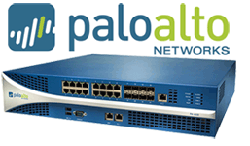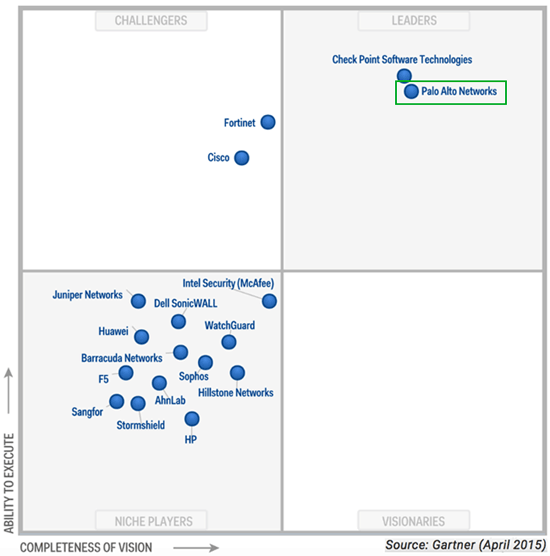Introduction to Palo Alto Next-Generation Network Firewalls
 During the past decade, we’ve seen the global IT security market flooded with new network security and firewall security appliances. New vendors emerging into the market while existing well-known vendors introduce new smarter and complex firewalls that aim to keep enterprise organizations as safe as possible. Palo Alto Networks is one of the new-generation security vendors who have managed to break into a saturated market and make their stand.
During the past decade, we’ve seen the global IT security market flooded with new network security and firewall security appliances. New vendors emerging into the market while existing well-known vendors introduce new smarter and complex firewalls that aim to keep enterprise organizations as safe as possible. Palo Alto Networks is one of the new-generation security vendors who have managed to break into a saturated market and make their stand.
It’s no coincidence that Palo Alto Networks is considered to be a leader and pioneer when it comes to Next Generation Firewall appliances and Gartner seems to agree with this statement based on their Magic Quadrant report in the Next Generation Firewall Segment:

Figure 1. Gartner Magic Quadrant for Enterprise Network Firewalls
Palo Alto Networks Next-Generation Firewalls unique way of processing a packet using the Single Pass Parallel Processing (SP3) engine makes them a clear leader.
Note: Read all our technical articles covering Palo Alto Firewalls by visiting our Palo Alto Firewall Section.
Basically, the SP3 engine utilizes the same stream-based signature format to process the protection features like Anti-Virus, Spyware, Vulnerability Protection and Data Filtering. By doing so the firewall saves valuable processing power, unlike other Unified Threat Management (UTM) appliances which serially process each security feature offered, this often introduces latency to the network traffic.
The advanced security features like App-ID, User-ID, Content-ID along with Security profiles, comprising feature like Antivirus, Anti-Spyware, Vulnerability protection, URL Filtering, DoS Protection and Data Filtering makes Palo Alto the leader. Most importantly its malware analysis solution WildFire offers advanced protection from unknown threats.
Palo Alto Networks offers its firewalls as Hardware Platforms and Virtual Platforms. Its Hardware Platforms comes in different flavors.

Figure 2. The Palo Alto Firewall family
PA-200 and PA-500 Series Firewalls are meant for Small Businesses and come with very limited throughput and do not support Virtual Systems. Virtual Systems, also known as VSYS, is used to create virtual firewall instances in a single-pair of Palo Alto Firewalls, in other words, Virtual Systems can be compared to contexts in Cisco ASA Firewalls or vdom in Fortinet firewalls. The PA-200, PA-500 Series Firewalls offer a very limited number of security policies like security rules, NAT rules, policy based forwarding rules and a few more.
Datasheets on Palo Alto Firewall appliances and Virtual Servers are available at our Palo Alto Datasheets and Guides download area
The table below provides a clear comparison of features and technical specifications of both PA-500 and PA-200 firewall models:
|
Features |
||
|
Performance |
||
|
App-ID firewall throughput |
250 Mbps |
100 Mbps |
|
Threat prevention throughput |
100 Mbps |
50 Mbps |
|
IPSec VPN throughput |
50 Mbps |
50 Mbps |
|
Connections per second |
7,500 |
1,000 |
|
Sessions |
||
|
Max sessions (IPv4 or IPv6) |
64,000 |
64,000 |
|
Policies |
||
|
Security rules |
1,000 |
250 |
|
Security rule schedules |
256 |
256 |
|
NAT rules |
160 |
160 |
|
Decryption rules |
100 |
100 |
|
App override rules |
100 |
100 |
|
QoS rules |
100 |
100 |
|
Policy based forwarding rules |
100 |
100 |
|
Captive portal rules |
100 |
10 |
|
DoS protection rules |
100 |
100 |
Table 1. Technical Specifications of PA-500 & PA-200 Firewall Appliances
The PA-2000 & PA-4000 Series Firewalls are older End-of-Sales platforms, but can certainly be used for any type of lab environment and training.
The PA-3000 series Palo Alto Firewalls like the PA-3020, PA-3050 & PA-3060 are good for Mid-Size Enterprise Networks and they offer a throughput (App-ID) between 2Gbps and 4Gbps based the on model selected. The PA-3060 is the only firewall that comes with 2 x 10Gbps SFP+ Interfaces, while the rest of the PA-3000 Series offer only 1Gig Interfaces, which are both copper and fiber.
Table 2 below compares features and technical specifications between the PA-3020, PA-3050 & PA-3060 firewall models:
|
Features |
|
|
|
|
Performance |
|||
|
App-ID firewall throughput |
4 Gbps |
4 Gbps |
2 Gbps |
|
Threat prevention throughput |
2 Gbps |
2 Gbps |
1 Gbps |
|
IPSec VPN throughput |
500 Mbps |
500 Mbps |
500 Mbps |
|
Connections per second |
50,000 |
50,000 |
50,000 |
|
Policies |
|||
|
Security rules |
5,000 |
5,000 |
2,500 |
|
Security rule schedules |
256 |
256 |
256 |
|
NAT rules |
5,000 |
5,000 |
3,000 |
|
Decryption rules |
500 |
500 |
250 |
|
App override rules |
500 |
500 |
250 |
|
QoS rules |
1,000 |
1,000 |
1,000 |
|
Policy based forwarding rules |
500 |
500 |
500 |
|
Captive portal rules |
1,000 |
1,000 |
1,000 |
|
DoS protection rules |
1,000 |
1,000 |
1,000 |
|
Interfaces |
|||
|
Mgmt - out-of-band |
10/100/1000, RJ45 console |
10/100/1000, RJ45 console |
10/100/1000, RJ45 console |
|
Mgmt - 10/100/1000 high availability |
2 |
2 |
2 |
|
Mgmt - 40Gbps high availability |
NA |
NA |
NA |
|
Traffic - 10/100/1000 |
8 |
12 |
12 |
|
Traffic - 1Gbps SFP |
8 |
8 |
8 |
|
Traffic - 10Gbps SFP+ |
2 |
NA |
NA |
Table 2. Comparing the PA-3020, PA-3050 & PA-3060 firewall models
The PA-5000 Series firewalls such as the PA-5020, PA-5050 & PA-5060 are very powerful and best suited for medium to large Enterprise Networks. This series of firewalls offers an impressive throughput (App-ID) between 5Gbps and 20Gbps. These are the most stable firewalls the industry has seen and it’s often recommended to have a PA-5060 firewall as a Data Centre Firewall for mid to large size data centres.
|
Features |
|
|
|
|
Performance |
|||
|
App-ID firewall throughput |
20 Gbps |
10 Gbps |
5 Gbps |
|
Threat prevention throughput |
10 Gbps |
5 Gbps |
2 Gbps |
|
IPSec VPN throughput |
4 Gbps |
4 Gbps |
2 Gbps |
|
Connections per second |
120,000 |
120,000 |
120,000 |
|
Interfaces |
|||
|
Mgmt - out-of-band |
10/100/1000, RJ45 console |
10/100/1000, RJ45 console |
10/100/1000, RJ45 console |
|
Mgmt - 10/100/1000 high availability |
2 |
2 |
2 |
|
Mgmt - 40Gbps high availability |
NA |
NA |
NA |
|
Traffic - 10/100/1000 |
12 |
12 |
12 |
|
Traffic - 1Gbps SFP |
8 |
8 |
8 |
|
Traffic - 10Gbps SFP+ |
4 |
4 |
NA |
Table 3. Comparing the PA-5020, PA-5050 & PA-5060 firewall models
The PA-7000 Series firewalls are the chassis based firewalls available in PA-7050 & PA-7080 models, these firewalls offer a huge throughput (App-ID) between 120Gbps and 200Gbps, and are targeted for Service Provider Networks.
|
Features |
|
|
|
Performance |
||
|
App-ID firewall throughput |
200 Gbps |
120 Gbps |
|
Threat prevention throughput |
100 Gbps |
60 Gbps |
|
IPSec VPN throughput |
80 Gbps |
48 Gbps |
|
Connections per second |
1,200,000 |
720,000 |
|
Interfaces |
||
|
Mgmt - out-of-band |
10/100/1000, RJ45 console |
10/100/1000, RJ45 console |
|
Mgmt - 10/100/1000 high availability |
2 |
2 |
|
Mgmt - 40Gbps high availability |
2 |
2 |
|
Traffic - 10/100/1000 |
120 |
72 |
|
Traffic - 1Gbps SFP |
80 |
48 |
|
Traffic - 10Gbps SFP+ |
120 |
72 |
|
Routing |
||
|
IPv4 forwarding table size* |
32,000 |
32,000 |
|
IPv6 forwarding table size* |
32,000 |
32,000 |
|
Max route maps per virtual router |
50 |
50 |
|
Max routing peers (protocol dependent) |
500 |
500 |
|
Static entries - DNS proxy |
1,024 |
1,024 |
|
L2 Forwarding |
||
|
ARP table size per device |
32,000 |
32,000 |
|
IPv6 neighbor table size |
32,000 |
32,000 |
|
MAC table size per device |
32,000 |
32,000 |
|
Max ARP entries per broadcast domain |
32,000 |
32,000 |
|
Max MAC entries per broadcast domain |
32,000 |
32,000 |
Table 4. Technical specifications of the PA-7000 series firewalls targeting Service Provider Networks
Palo Alto Networks also offers Virtual Firewalls that are ideal for protecting virtual data centres and "East-West" traffic. With the advent of Software Defined Networking and the growing popularity of VMWare NSX, Palo Alto is offering a dedicated Virtualized Firewall VM-1000-HV. The Palo Alto VM-1000-HV was specifically developed to support VMWare NSX setups along with VMWare ESXI, Citrix Netscaler SDX , KVM and Amazon Web Services (AWS) platforms.
Palo Alto also offers the VM-300, VM-200 and VM-100 Virtualized platforms which offer a throughput (App-ID) of 1Gbps.
|
Feature |
|||
|
Performance |
|||
|
App-ID firewall throughput |
1 Gbps |
1 Gbps |
1 Gbps |
|
Threat prevention throughput |
600 Mbps |
600 Mbps |
600 Mbps |
|
IPSec VPN throughput |
250 Mbps |
250 Mbps |
250 Mbps |
|
Connections per second |
8,000 |
8,000 |
8,000 |
|
Sessions |
|||
|
Max sessions (IPv4 or IPv6) |
250,000 |
250,000 |
100,000 / 50,000 |
Table 5. The VM-300, VM-200 and VM-100 virtual Palo Alto firewall appliances
Palo Alto Firewalls have been quickly adopted by thousands of organizations around the globe thanks to their advanced security features, incredible performance and ability to provide complete unified threat management security services without degrading network speed. Visit our Palo Alto Firewall section for more technical and how-to articles.
Your IP address:
18.222.170.43
Wi-Fi Key Generator
Follow Firewall.cx
Cisco Password Crack
Decrypt Cisco Type-7 Passwords on the fly!
















